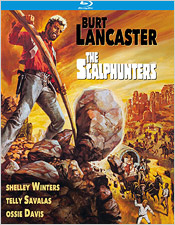Scalphunters, The (Blu-ray Review)

Director
Sydney PollackRelease Date(s)
1968 (July 22, 2014)Studio(s)
United Artists/20th Century Fox/MGM (Kino Lorber Studio Classics)- Film/Program Grade: C-
- Video Grade: B-
- Audio Grade: B-
- Extras Grade: D-
Review
Sydney Pollack directed The Scalphunters in 1968 with a strong leading cast, including Burt Lancaster, Ossie Davis, Shelley Winters, Telly Savalas, and a small role with Dabney Coleman in it. And while the material probably reads very strongly on the page, the resulting film is kind of a mess, mostly in tone.
The Scalphunters tells the story of Joe Bass (Lancaster), a fur trapper who has been skinning hides all winter, only to have them taken away from him by Kiowa Indians. After pursuing them, the hides are stolen again by a group of men who are out to scalp the Kiowa Indians for profit. Along the way, Bass meets Joseph Lee (Davis), a runaway slave who Bass decides to take with him and sell after he retrieves his stolen hides from the scalphunters. However, it won’t be easy, as the group’s leader Jim Howie (Savalas), with his prostitute Kate (Winters) by his side, won’t allow that happen.
To be a bit critical, this a movie that can’t really make up its mind what it wants to be about, or what kind of tone it wants to follow through on. There are some obvious character comparisons going on between Burt Lancaster’s character and Telly Savalas’ character, as both men are strong-minded, bull-headed, and have fierce convictions, but both men are on different sides of the playing field and the movie plays with the idea of their moral convictions, or at least that’s what I think they were going for. In the middle of all of this is Ossie Davis’ character, a runaway slave who wants nothing more than to get away from everyone and be free, and he must play his part with both men in order to do it.
The most obvious problem with the tone of the movie is the score, which is sometimes serious, but mostly just silly and cornballish in nature. It’s definitely the main aspect of the movie that gives it its identity crisis. It also doesn’t help that Burt Lancaster seems to be in the wrong movie. He’s meant to be playing a very simple man (more or less admitting that he can’t read or write), but yet he spouts that sharp Burt Lancaster dialogue that he’s well known for. He just doesn’t seem to be right for it. On the other hand, one could argue that he’s the main reason for seeing the film in the first place. And Shelley Winters, as a character at least, is even more pointless. She seems as if she’s going to have some kind of an arc, but by the end of the film, she continues to be the woman she’s been for the previous hour and a half.
The film doesn’t even really have that interesting of a look to it either. Framing is mostly boring, and there’s nothing much good to look at anyways. There are some good scenes to be had here and there with some nice dramatic weight to them, but they’re all jumbled into a messy story that doesn’t know what it wants to accomplish. By and large, a different score would definitely have helped, but a complete re-write from the very beginning (and dare I say, better direction) would have helped even more. It’s not a complete waste of time, but it could have been sharper in execution.
For Kino Lorber’s presentation of the film, it’s a very clean transfer that hasn’t been scrubbed or polished up to make it appear much better than it is. A mostly stable film print has been used with a heavy grain structure. There isn’t a whole lot of blatantly obvious film damage leftover for this transfer, but there is some occasional flickering, as well as some unstable frames in one scene. The color palette appears a bit washed out and too bright overall, but blacks can run deep when given the chance. Overall, it’s a healthy presentation that looks very good, but might not impress those who were hoping for a keener restoration of the film. The audio, which is a single English 2.0 DTS-HD track, is of the same caliber. Dialogue is usually clear, as are the sound effects with some good ambiance from time to time. And while it’s unnecessary for the film itself, the score benefits the most from the upgrade in quality, and gets its time to shine. There are also subtitles in English for those who might need them.
Unfortunately, the only extra that’s been included is the original theatrical trailer. That’s about as much as can be expected from a release of this film, which doesn’t have a very strong following. It’s more interesting as discussion material more than anything. It hasn’t had a strong aftermarket life either, but The Scalphunters is a good example of why it’s important to try and achieve an even tone with your movie, even if it’s not always the most comfortable tone. And again, the main reason for seeing it is Burt Lancaster, who is one of those actors that you can’t seem take your eyes off of whatever’s he in, even if he’s wrong for the part.
- Tim Salmons

